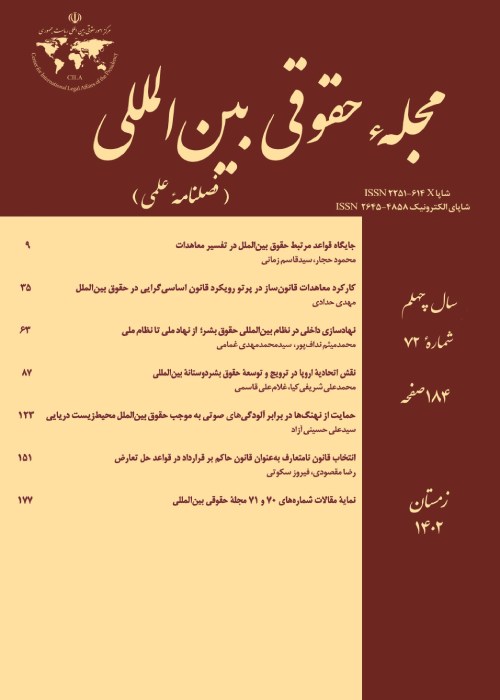Effective Factors in Determining Responsibility of WTO Members
Author(s):
Abstract:
There are many agreements under the World Trade Organization regarding trade in goods, services and intellectual property. These agreements have led to increased economic exchanges and have established regulations for international trade. Regardless of the nature and content of these agreements, legal responsibility of WTO members has emerged in dispute settlement understanding. This represents a combination of state responsibility in international customary and conventional law. Combined with relevant trade principles such as proportionality, reciprocity, and effectiveness, these agreements create effective enforcement of WTO law. In this view, any nullification or impairment of members’ benefits or impediment to the attainment of any objects of the agreement would be considered as a violation of the agreement and the member in breach would be held responsible. In other words, when WTO members are faced with derogation of an agreement by other members, they will have some options as potential reparations. At the first instance, the “Principle of Compliance” allows them to have recourse to restitution, withdrawal, or reform in executive, legislative or judiciary measures which are in conflict with WTO provisions. If this final remedy proves to be ineffective, at the second instance WTO members have a right to obtain temporary remedies (including compensation, retaliation, suspension, withdrawal from obligation, or concessions). In certain circumstances, however, there also exists the possibility for members to invoke unilateral trade remedies. Such a hierarchy for remedies is to be followed by all WTO members. The international responsibility of states consists of two elements: the wrongful act (the violation of an international obligation) and the attribution. In this article I analyze the main factors playing a role in WTO members’ responsibility. These factors are considered as common denominators for declaring WTO members’ responsibility when they are faced with ultimate or temporary reparations or trade remedies. These factors include principle of reciprocity, proportionality, effectiveness, and use of interpretation and the role of time which all strongly affect the relations between plaintiff and the defendant as WTO members. This is not an exhaustive list, and there are possibly many other factors in WTO cases that are not discussed in this article.
Keywords:
Language:
Persian
Published:
International Law Review, Volume:31 Issue: 51, 2015
Page:
205
magiran.com/p1384397
دانلود و مطالعه متن این مقاله با یکی از روشهای زیر امکان پذیر است:
اشتراک شخصی
با عضویت و پرداخت آنلاین حق اشتراک یکساله به مبلغ 1,390,000ريال میتوانید 70 عنوان مطلب دانلود کنید!
اشتراک سازمانی
به کتابخانه دانشگاه یا محل کار خود پیشنهاد کنید تا اشتراک سازمانی این پایگاه را برای دسترسی نامحدود همه کاربران به متن مطالب تهیه نمایند!
توجه!
- حق عضویت دریافتی صرف حمایت از نشریات عضو و نگهداری، تکمیل و توسعه مگیران میشود.
- پرداخت حق اشتراک و دانلود مقالات اجازه بازنشر آن در سایر رسانههای چاپی و دیجیتال را به کاربر نمیدهد.
In order to view content subscription is required
Personal subscription
Subscribe magiran.com for 70 € euros via PayPal and download 70 articles during a year.
Organization subscription
Please contact us to subscribe your university or library for unlimited access!


